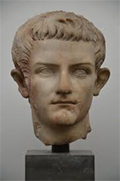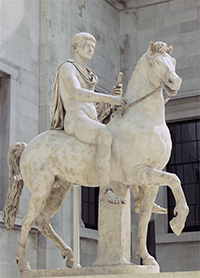Caligula: Third Emperor of Rome
Caligula was Emperor of Rome for four years in the 1st Century A.D. He sowed chaos and discord and was killed by his own bodyguard. 
He was born Gaius Julius Caesar on August 31, 12, in Antium. His father was Germanicus, and his great-grandfather was the first emperor, Augustus. His adopted grandfather, Tiberius, was also royalty, succeeding Augustus as emperor. Young Gaius accompanied his father on campaign and got his nickname Caligula ("little boots") from the miniature uniform that he wore. In 31, he went to Capri to live with Tiberius, who adopted him and made him his heir. When Tiberius died six years later, Caligula was one of two heirs, the other being Tiberius's grandson, Tiberius Gemellus. Stories of cruelty and disordered behavior on Capri abounded, and Caligula at 19 and into his early 20s, absorbed the stories and witnessed some of the behavior, often joining in when he felt the urge (which, many historians say, was often). When Tiberius died, in 37, Caligula and Gemellus were the successors. Tiberius had fallen ill but had recovered, only to die a sudden death, and some historians think that Caligula played in a part in Tiberius's death. Gemellus died not long afterward, in mysterious circumstances, and Caligula alone was Emperor of Rome. He was 24 and had no experience in diplomacy, government, or war. He set about freeing many people whom Tiberius had imprisoned, stopped the treason trials that had been a favorite of Tiberius, increased the pay for the Praetorian Guard, and also did away with an unpopular tax. He found competition thrilling and large-scale public competitions doubly so and ordered the production of many entertainments for the populace, such as boxing matches, chariot races, and gladiator matches. He completed many building projects initiated by Tiberius and also ordered the construction of a large handful of new building projects, including an amphitheater at Pompeii, a lighthouse at Boulogne, and a large racetrack, inside which was an obelisk he had brought from Egypt. He ordered the construction of two major aqueducts in Rome, the Aqua Claudia and the Anio Novus. Struck with severe illness, he barely escaped death but returned a different person. He took to wandering the royal palace in the middle of the night and, in the daytime, took to wearing silken gowns normally worn by women. He ordered public executions just to watch them happen and sometimes forced parents to witness the deaths of their children.  He declared himself a living god and ordered built a bridge between the royal palace and the Temple of Jupiter, so he could meet with the deity. Despising the Jewish population in Judah, he threatened to erect a statue of himself in the Temple of Jerusalem; in a rare fit of reasonableness, he left himself be talked out of such an action. He did, however, target the Jewish population for cruelty and persecution. He identified a large number of political enemies and then had them eliminated; having been lauded for doing away with Tiberius's treason trials, he brought them back with a vengeance, confiscating the money and property of those who were targeted. He also raised taxes in order to finance an increasing number of public spectacles; this included taxes on lawsuits and weddings. The owner of all he could see or imagine, he had a favorite horse, that he named Incitatus and to which he awarded jewel-encrusted collars; to the Senate he proposed giving Incitatus the title of consul. He also had built two enormous ships on Lake Nemi that measured 250 feet long and 70 feet wide and were nothing so much as floating palaces for the emperor to indulge his preference for indulgence. The ship walls were inlaid with ivory and punctuated by mosaics. He annexed Mauretania as a province, ordered the Roman army to fight against armies in Germany, and, on one prospective campaign in northern Gaul, ordered the soldiers to pick up seashells and hand them to him, so he could take them back to Rome and show off his wealth. His excesses and strange behavior drove members of his own guard to kill him. They did it on Jan. 24, 41. His wife and daughter were also killed. Wishing to erase his memory, the Senate ordered the destruction of all of the statues of him that he had ordered built. He had married four times and had two children, one of whom he had adopted. Succeeding Caligula as Emperor of Rome was his uncle, Claudius.
|
|
Social Studies for Kids
copyright 2002–2026
David White




